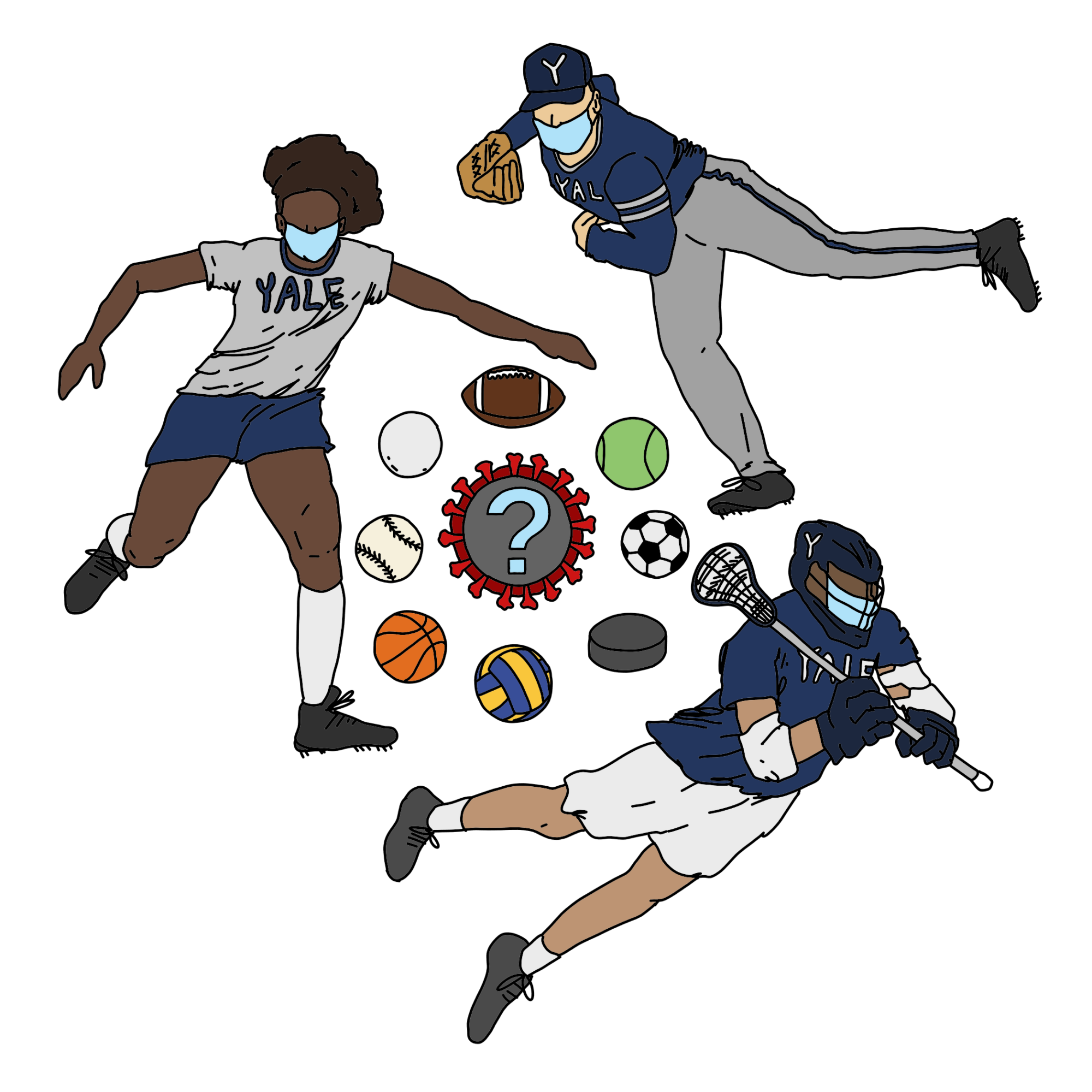Yale epidemiologists uncertain about possibility of spring-semester competition
Dept. Chair Albert Ko mentioned that limiting “superspreading” events will be crucial to maintaining a low rate of viral transmission on Yale’s campus if varsity competition resumes in the spring, while Director of the Yale Institute for Global Health Saad Omer stressed that it is too early to determine the likelihood of spring-semester competition.

Anasthasia Shilov, Illustrations Editor
With the Ivy League’s decision on spring-semester athletic competition still unannounced, Yale epidemiologists and some coaches are expressing uncertainty about the feasibility of restarting athletic competition in the spring given the ongoing COVID-19 pandemic.
Department Chair and professor of epidemiology Albert Ko and Director of the Yale Institute for Global Health Saad Omer discussed the likelihood of spring-semester athletic competition at Yale with the News. Ko detailed the precautions that students, coaches and athletic staff must take if undergraduate sports resume in the spring. He mentioned that limiting “superspreading” events will be crucial to maintaining a low rate of viral transmission on Yale’s campus if varsity competition resumes in the spring, while Omer stressed that it is too early to determine the likelihood of spring-semester competition.
“We know about superspreading,” Ko said. “We know about that kind of general rule … that 20 percent of people will contribute to 80 percent of the transmission. One of the interventions against superspreading is to limit gathering size because you lower the probability of having these kinds of superspreading events. I think much of [whether sports will resume] will have to depend on where we are on the epidemic curve in the spring.”
When asked about what the Yale community might learn from the recent cluster of positive cases from members of the men’s hockey team, Ko described the cluster of cases as another classic example of superspreading. He explained that when people are in close contact for prolonged periods of time, whether on a cruise ship, at a bar or in the same room, transmission risk between people is heightened.
Omer also indicated that the U.S. is trending towards a third wave of the coronavirus. Moving into the “respiratory season” — marked by the prevalence of other viruses such as influenza — he said there needs to be a nationwide effort to flatten the curve.

He emphasized the importance of aggressively controlling the virus through non-pharmaceutical interventions, such as substantially increasing the use of masks and implementing broad social distancing — but not necessarily lockdowns — across the country.
“The NBA … has shown that you can play sports safely, but they had to go through extraordinary effort to actually make that happen,” Omer said. “It’s not just the contact part on the court or on the field, it’s also all sorts of other stuff that happens in the locker room and other close contact. Based on that, I would say it’s hard to predict at this point that even on a sport by sport basis you would have a situation where folks are able to play certain sports.”
Given the challenges mentioned by Omer and Ko and the constraints of the pandemic, the Ivy League has adopted a three-phase approach for returning to training this fall.
Less than a week after Yale Athletics reverted to an entirely virtual Phase 0 on Oct. 14, men’s tennis head coach Chris Drake and men’s heavyweight crew head coach Steve Gladstone shared their expectations for the future of phased training with the News this fall.
“If we’re able to do some phase work, then I think as an individual sport that’s pretty distanced, we get the benefit of at least being able to work in a more full capacity than other sports in that Phase II scenario,” Drake said.
Drake and Gladstone said there are five men’s tennis players and 12 heavyweight rowers currently enrolled in residence and training in New Haven. In adapting their training to the circumstances, the heavyweight men moved their equipment to the green outside Payne Whitney Gymnasium for endurance workouts.

Gladstone told the News he is not optimistic about a racing season this spring. As Ivy League schools operate on different academic schedules and the number of students permitted on each campus varies, he questioned who would be there to compete.
“They’re a lot of people at all of these universities that are taking the year off, so what kind of Eastern Sprints champion would you have?” Gladstone said. “What kind of IRA champion would you have? It would be a very, very watered down non-representative group.”
Without a season or formal competition ahead, Drake said student-athletes have to create their motivation and improve for the sake of improving. He has been hosting weekly Zoom calls to connect the full team, and he hopes his tennis players can maintain a sense of athletic purpose this fall despite the disrupted practice routines and ambiguity around competition.
Drake said he is hoping for a season and expressed his faith in the Ivy League and Yale leadership to make a prudent decision.
“I think they’re people who know a lot better than I do what’s safe and what’s not, and they’re thinking about more than just the whole tennis team,” Drake said.
Director of Athletics Vicky Chun echoed Drake’s sentiments. She expressed that the Ivy League presidents utilize medical information made available from public health experts to make the most informed decisions for student-athletes, coaches and staff.
She is confident that protocols and guidelines set by the University and its athletic department work if followed.
“We will continue to prepare our student-athletes and when it’s time to compete, we’ll be ready,” Chun wrote in an email to the News.
The Ivy League’s decision to cancel fall-semester athletic competition remains in place until Jan. 1, 2021.
Sydney Gray | sydney.gray@yale.edu
Zach Morris | zach.morris@yale.edu







